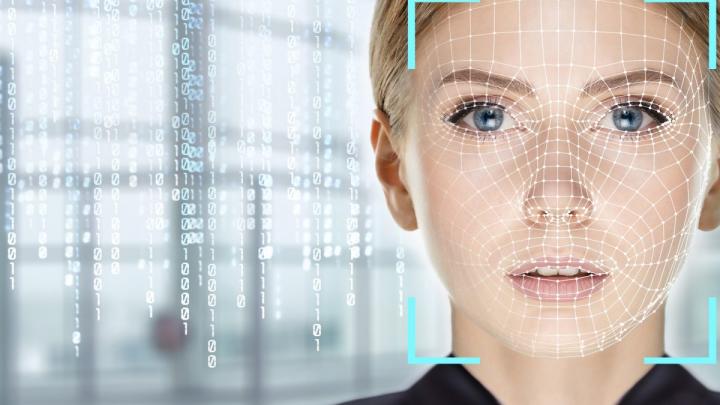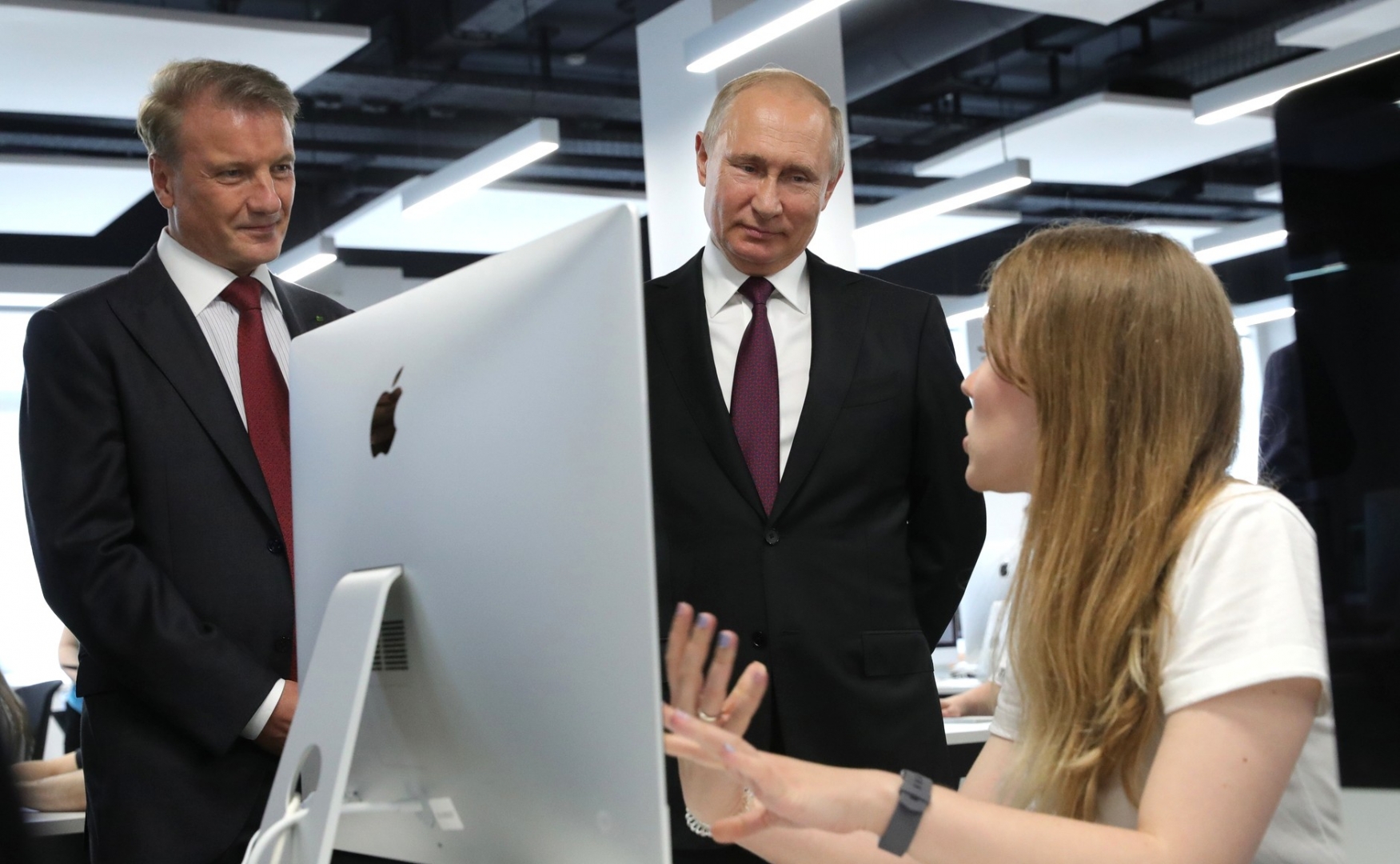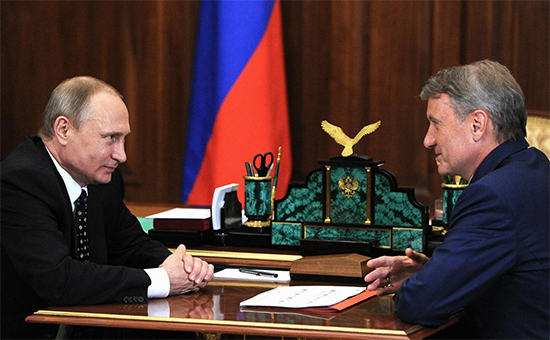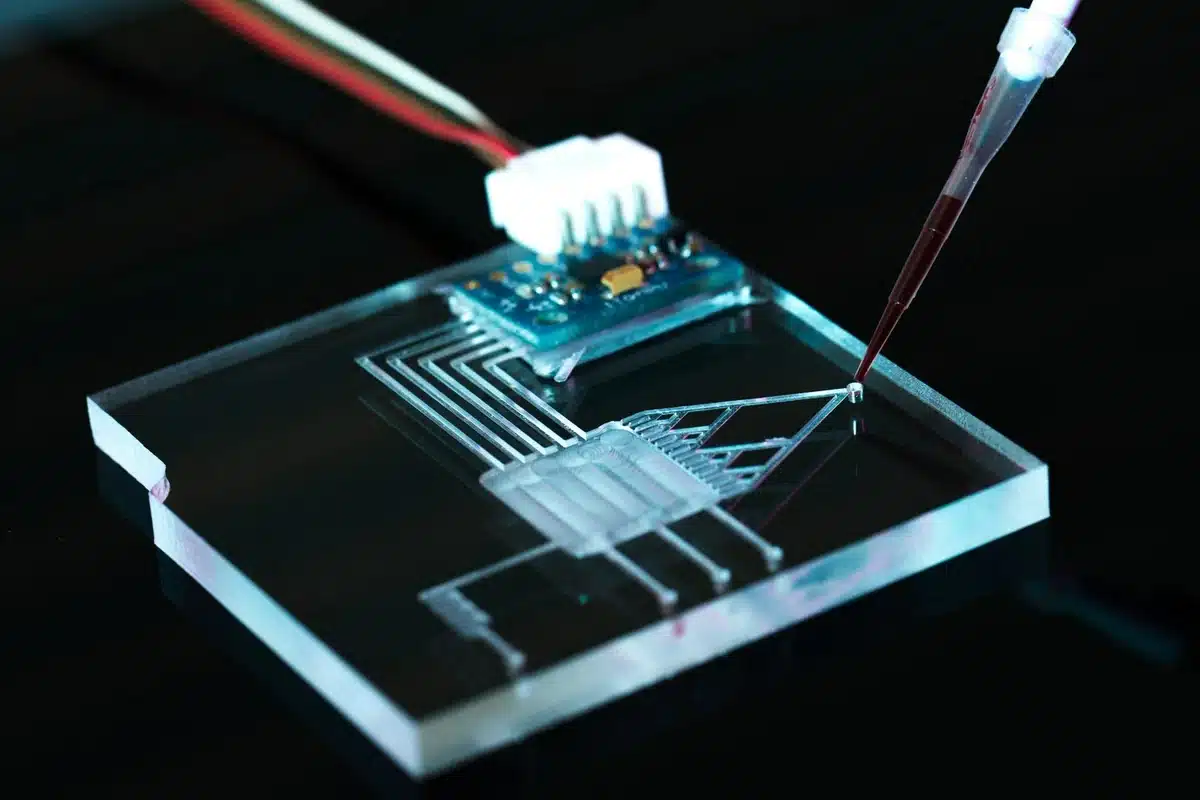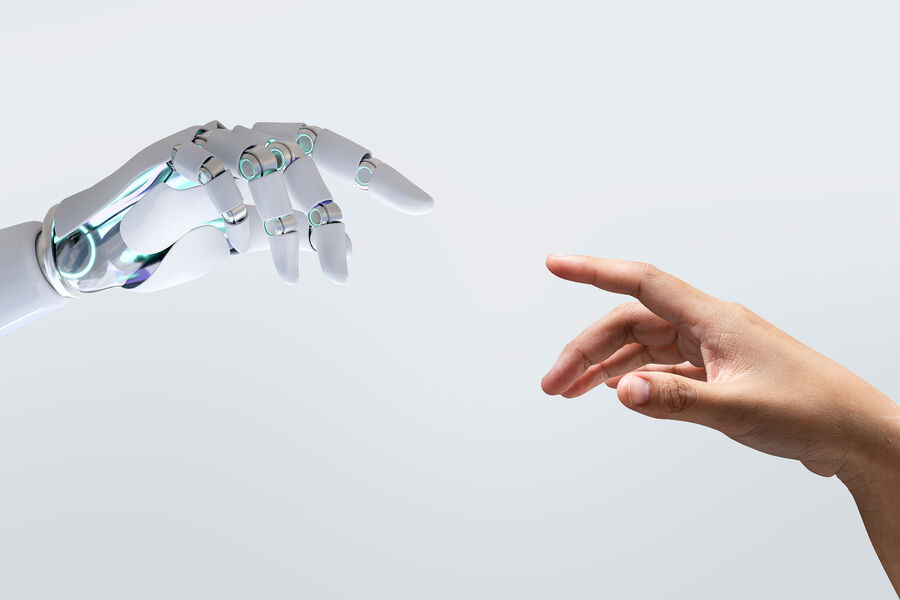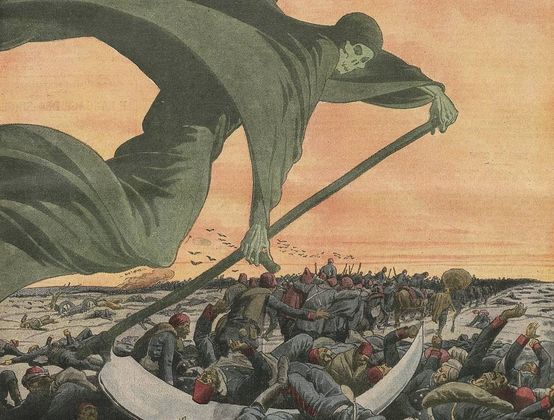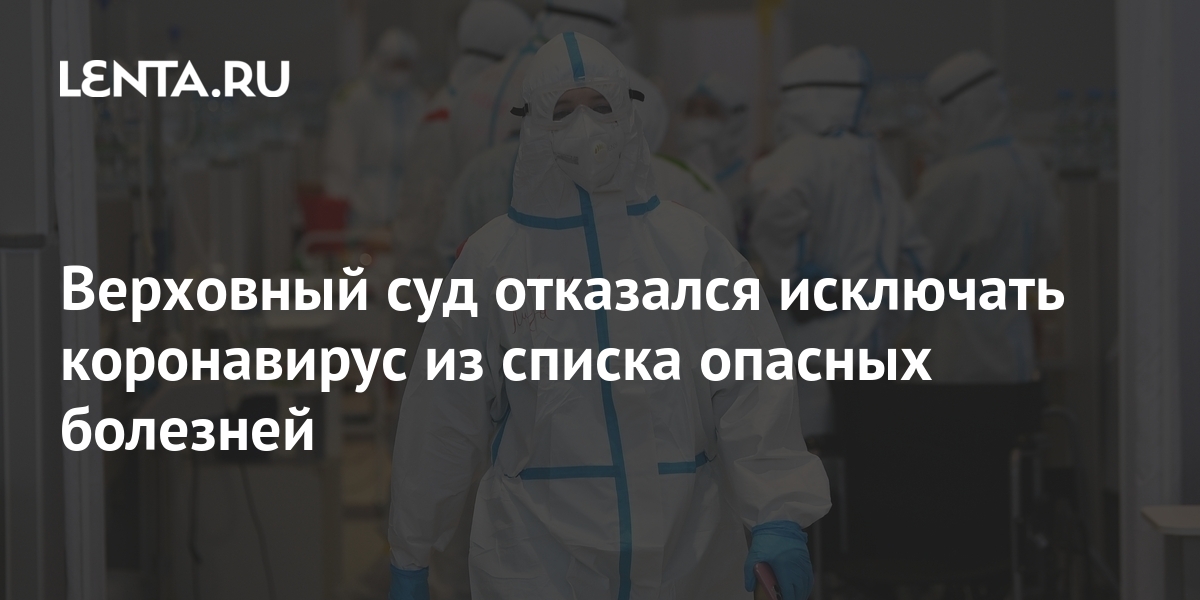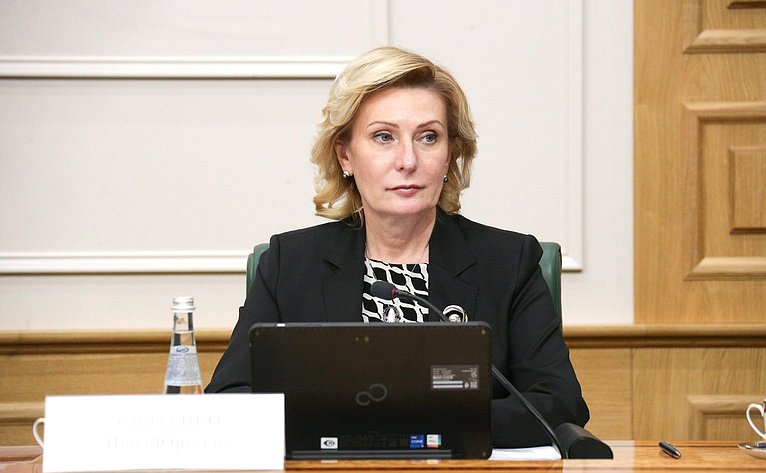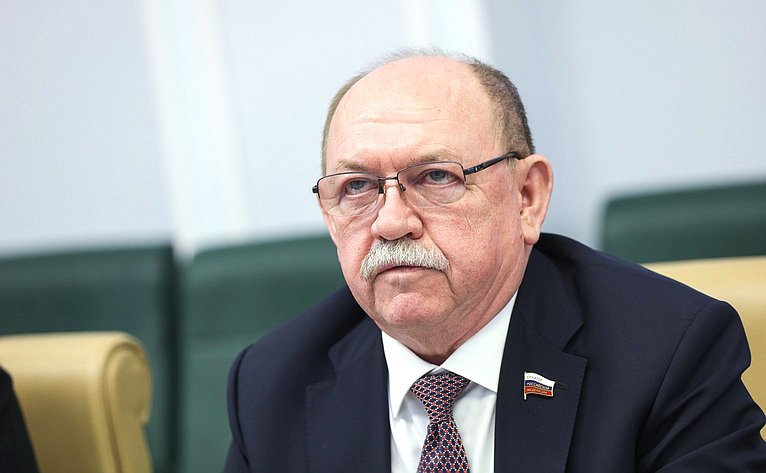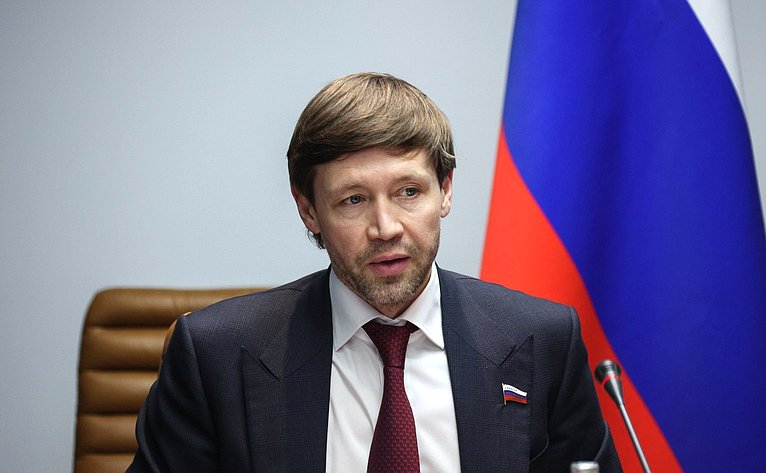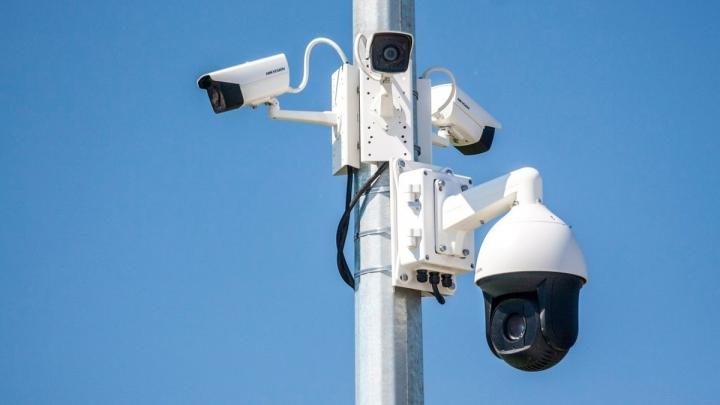November 25, 2022
RUSSIA AND ITS CITIZENS ARE IN THE POCKET OF AN AI OPERATOR, OR GREF BROADCASTS THROUGH THE MOUTH OF PUTIN

Over the past two days, the transhumanist bankster Herman Gref (personally) and the head of the RDIF, highlighted by Klaus Schwab as one of the young shaper leaders of the World Economic Forum, Kirill Dmitriev (behind the scenes) attracted the attention of the official media and officials with their "Journey with artificial intelligence" (AIJ-2022 forum). By tradition, the main episode of the digital sabantuy was the speech of the leader of the state Vladimir Putin. And just as traditionally, Putin read out a program speech prepared for him in advance. It was the most serious speech by the president since September, when he announced the admission of Russian territories of the former Ukraine to Russia. While the press secretary of the first person cannot really name either the date of the traditional press conference or the time of the message to the Federal Assembly, Putin had more than enough time for the digital transformers event. Moreover, this time we have heard specific, tough directives from the president to the Government and business, which will soon certainly take the form of specific decrees and instructions. In short, Gref, Shadaev and Co. tightly took Putin into circulation. And, presumably, he really liked the book "The Fourth Industrial Revolution" presented by Klaus Schwab at an audience in Moscow. Because his whole speech was an ode to machine control, proactivity, the collection of huge arrays of personal data of citizens and, of course, the transfer of all spheres of life under the control of AI. The only thing that can change the situation here is a major "digital" upheaval on a national scale, which we all would very much not like.
Many believed that the AIJ-2020 forum, where Putin, together with the leader of Kazakhstan, globalist Tokayev, under the strict guidance of sodomite and globalist Gref, reasoned when AI could replace heads of state, was the crown of transhumanism. They hoped that in the conditions of Russia's economic isolation from the "collective West", ties with the World Bank, the WEF and other structures of the global monopolar world would be severed. But it turned out that the president was seriously hooked on the topic of innovation, fully trusting in this matter the lookout from JP Morgan and other global financial plutocracy – that is, Gref, who flatly refused to work in Crimea a few years ago, and also wrote dispatches to the White House administration with assurances of loyalty and a plea to lift sanctions from Sberbank.
And this hater of exams, physical education schools, the best Soviet education in the world, an adept of the sectarian false yogin Sadhguru and the author of the "cult" phrase in the spirit of the theory about the "golden billion", which, by the way, Putin fiercely criticizes during popular speeches ("six out of seven billion should be eliminated...") felt like a king before the speech of the President of the Russian Federation. Gref gave him his "eyeliner":
"
In Russia in recent years, I would say in the last two years, a serious step forward has been made, a leap has been made both at the regional level and at the Government level. The government is doing a lot to create conditions for the development of artificial intelligence in almost all areas.
Of course, the experiment that you allowed Moscow allowed it to take a huge step forward. Healthcare, social services, and work with the population have all been transferred to other tracks.. / ... / The popularity of views of our conference at the international level is growing, in two days we have more than 50 million views from more than 180 countries around the world..."
Of course, the Government of the digital transformer Mishustin promptly implements the precepts of Schwab, helping Gref in this. Moreover, a special legal regime in the capital helped to "put everything on a different track." Which ones, and why they "ski better", and whose "skis", Gref, of course, did not specify.
....
Then the President of Russia took the floor, starting with the same curtsies to AI and Gref:
"Russia's achievements in the field of AI are certainly there. In terms of some achievements in this area, we are one step ahead of some other countries, and we must definitely step up these efforts, concrete steps in this regard..."
I would like to appeal to the president (more precisely, to the authors of his paper, which he read). What exactly are we ahead of? How exactly has the life of Russian citizens become more prosperous and happier thanks to the introduction of AI? After all, it is declared that the country needs digital transformation like air. So where is at least one concrete and illustrative example of the positive effect of it?
"
I will probably say things that are obvious to everyone: the importance of breakthroughs in the field of artificial intelligence is enormous, the rivalry between states is fierce. Russia's place in the world, our sovereignty, security and solvency of our country, our ability to solve problems of economic, industrial, social development at a qualitatively new level, create broad conditions for self-realization of citizens, for launching public initiatives depend on what results we achieve."
A familiar story about the promotion of the agenda of globalism-transhumanism under the guise of "the struggle for technological sovereignty". In the direction of this mantra, for example, the founder of ASI and several foresights (based on the same Western strategies for the development of the world until 2030), now the chief digitizer under the president Dmitry Peskov, quickly changed his shoes.
"
I would also like to thank not only our creators, developers, but also those colleagues who promote the technological agenda and set such an important vector for the future of the country. This is BEAC, which has assumed the main responsibility for coordinating the development of artificial intelligence; this, of course, – I can't say about my colleagues in the Government – these are the ministries of digital and Economic Development."
Here the compilers of the speech, which Putin read exclusively from a piece of paper, did not fail to stroke the main curators of all this action in Russia – that is, Mishustin, Shadaev, Gref, Reshetnikov, etc.
"
I would like to note that Russia, according to international experts, is one of the global leaders in the field of digitalization of public services, is among the top ten in the world. As far as I understand, 198 countries are evaluated. The top three are South Korea, Brazil, and Saudi Arabia. All of these are our good partners, and some of them we can call our closest partners."
Finally, the numbers are called, and that's good. Russia is a global leader in the digitalization and development of AI, is in the TOP 10 countries of the world. Excellent. And what is the standard of living of our citizens, in comparison with the "partners", what is our real place here?
Since our officials and financiers are so fond of international ratings and are equal to evaluating themselves according to the data of "partners" ... Let's turn to the rating of the standard of living of countries in 2022, which includes such factors as wages, quality of medicine and education, freedom to conduct business, the level of security, ecology, the level of corruption, personal freedom and a number of other factors. It was compiled by the Legatum Institute (one of the most authoritative analytical centers in the UK), which identified the best countries to live in in 2022. and countries where people's lives are on the verge of survival. Russia is in... 90th place here, behind many African states, which we like to pejoratively call "banana republics".
And here is the report of the main office of the UN globalists, whose sustainable development goals we are so diligently fulfilling that we even wrote their priority into the Presidential Decrees. We are looking at the report on the Human Development Index in different countries of the world from January 2021. It is published annually and always arouses great interest all over the world. Of course, we are interested in Russia's place in this ranking.
The Human Development Index is "an integral indicator calculated annually for cross–country comparison and measurement of the standard of living, literacy, education and longevity as the main characteristics of the human potential of the study area." The higher the index, the better the quality of life in the country. And then Russia found itself in ... 52nd place, losing even to Kazakhstan and the former Baltic Soviet republics. These are our international indicators, alas. Finally, in terms of GDP per capita (a key indicator of the well-being of an individual in the country), according to the World Bank, Russia was in 55th place in 2021. Well, how is AI there, does it help a lot, as does our "global technological leadership"?
Then the program part of Putin's speech began, which contained direct instructions to the Government and the largest companies:
"
The task of a new stage in the horizon of the current decade is to ensure the mass introduction of artificial intelligence. It should cover all sectors of the economy, the social sphere and the public administration system. Herman Oskarovich [Gref] and I, when he was still working in the Government, talked all the time, this was Herman Oskarovich's hobby when he talked about the need to move to a new stage of management in general.
What we are doing now and what we are going to do, including with the support and experience of Sberbank, it seems to me, should convince us that we are on the right track. We must be able to form a genuine technological, digital and, to a considerable extent, cultural, educational, value sovereignty of Russia and our entire society."
Machine, algorithmized, automatic (proactive, as the Swabians like to say) management of the entire economy, the social sphere and the state, ultimately. What is this new stage of management, to which "we need to move on"? What is this "right way", where does it lead, what is the purpose of all this and most importantly, who needs it? There are no answers yet. But much becomes clear from Putin's orders:
"
In this regard, I ask the Government and the State Council, as part of the work on digital transformation, to prepare and then implement the transition of the entire system of state power at the federal and regional levels to a data-based management model using a platform approach.
It should be added that it is necessary to achieve this task in all authorities and in all key industries. And I really ask you, dear colleagues, – I am now addressing the alliance members once again – to provide the Russian Government, your colleagues with whom you are in constant contact, with the necessary advisory support."
The state as a platform, as a set of ecosystems... does it resemble anything? Of course, this is a direct reflection of the blue dream of Gref and his Western masters – "the state is in your pocket," as Oskarovich himself aptly put it. And Nikita Sergeyevich Mikhalkov made a brilliant analytical program – "Who has the state in their pocket?". It's better to see it once – and everything becomes obvious. A state without subjectivity in management, everything is based on machine algorithms... how can computer algorithms, robots control living people in general? How can they replace officials who, whatever one may say, have a human nature and are capable, if they want to, of course, enter into the situation of another person.
"
I will also note what Herman Oskarovich has already said in relation to Moscow. I would like to note that Moscow – and today I will refer to its experience more than once – has made a cardinal step forward in the field of digital transformation of many areas of urban economy.
In turn, the Moscow Region is on the verge of implementing a landmark project. We are talking about implementing a full-scale change in the management system with the widespread end-to-end introduction of artificial intelligence technologies. Maybe the governor – I see he is in the hall – will also say this a little later.
I ask both the Mayor of Moscow, Sergei Sobyanin, and the Governor of the Moscow Region, Andrei Vorobyov, to use the platform of the State Council to spread their experience of using the latest technologies to the whole country – as we do with you, dear colleagues, in some other areas," Putin continued.
That is, Sobyanin and Vorobyov, who turned citizens into bio-objects with concentration camp QR codes, stuffed the regions with a system of total biometric surveillance, transferring payments, allowances, enrollments in kindergartens and colleges and other public services exclusively and without alternative into a figure, are examples for us to follow.
"...
The third is access to depersonalized data. Now, too, at the exhibition in relation to medicine, a colleague talked about this, and about her work, and about what is supposed to be done in the near future, talked about the need for access to this information. I agree with that, absolutely. I ask the Parliament to speed up work on the relevant draft law, it should be adopted as soon as possible. As far as I understand, it has already passed its first reading somewhere else in 2021 - it needs to be finalized.
There are, of course, issues related to the need to protect personal information, but as far as I understood a colleague who reported on the first floor at the exhibition, we are talking about depersonalized data. And this, of course, will help to improve the efficiency of medical care.
I understand well the concerns that arise here both from the state and from business. It is necessary to take into account all the concerns of citizens and entrepreneurs regarding access to massive amounts of information, create strong legislative guarantees for the protection of rights and freedoms here and definitely move forward. It is absolutely necessary to move forward, to establish all technological processes of formation, depersonalization, storage, and provision of access to data."
Talking about security here is more for reassurance, because no one can give any guarantees for the protection of PD transmitted on the American Internet and under constant threat of the human factor. Over the past year, officially (with the confessions of those who leaked), all possible PD has already leaked – both from large banks, and from Internet portals, and from food and clothing ordering services, and from the portal of Public Services and <url>, etc. The responsibility for this, by the way, is still purely symbolic.
Well, as for the allegedly depersonalized PD, many IT experts rightly point out that their depersonality is nothing more than an illusion, and any sane computer scientist will easily restore their identity when it is needed. It is necessary to legalize their widespread use for large-scale feeding of their AI so that it "trains on cats" in its template actions.
"
We need to continue to follow the path of forming modern, globally competitive legislative frameworks for industry regulation for the use of artificial intelligence and data management.
We have repeatedly talked with business colleagues about this. We understand that these restrictions are essential for business development, and we will analyze the situation together with you and make decisions. It is important that they are taken, of course, in a timely manner. I fully share your approach to these issues.
Of course, it is necessary to work closely to remove the so-called regulatory barriers that still remain. In this regard, I ask the Government, together with the alliance, developers, and real sector companies, to submit proposals to change specific regulatory requirements, technological standards, regulations, and other industry norms that prevent the introduction of artificial intelligence, and this should be done in the context of each industry. We need to specify everything as much as possible, then the work will be effective," the president said.
"Globally competitive legislative bases of regulation ..." is how drearily formulated, but the essence is simple: it is proposed to change Russian legislation according to the manuals of globalists-digital transformers, to become a tracing paper for their "innovative" laws and regulations. This is the first thing that the participants of various summits, from the G20 to the WEF, swear to: clean up their national legislation in order to give the green light to any experiments on people. And the AI Alliance will work on these changes together with the Government, of course – that is, the same BEAC, VKontakte, MTS, Yandex and RDIF. Is this why the world government intends to send the unsinkable Alexei Kudrin to Yandex, who has proved his loyalty to supranational structures with his long-term service to the IMF and other globalist structures?
"
Further, I propose to establish on a systematic basis, when providing budget subsidies to companies, requirements for improving efficiency and mandatory use of modern technologies, including artificial intelligence. The point is not only to encourage entrepreneurs to progress, but also to achieve through innovation the growth of the most important indicators, including labor productivity, so that we respond to this feedback in the course of working together with business."
What if companies don't want to implement AI, but at the same time they are valuable to the country and also apply for subsidies? They won't get them. Are there any signs of discrimination here?
"In this regard, I believe that every national project, state program should contain specific measures aimed at introducing artificial intelligence technologies in the industries."
The game is big: there is no sphere without AI, including the national projects "Education", "Demography" ... Apparently, the population will now also count AI ... in a new way, "objectively", instead of Rosstat. And we will have an eternal increase every day.
"
On the basis of digital currency technologies and distributed registries, it is possible to create a new system of international payments, and much more convenient, but at the same time completely safe for participants and, importantly, independent of banks and interference from third countries. I am sure that something like this will certainly develop, because nobody likes the dictate of monopolists and causes real damage to everyone - by the way, to the monopolists themselves."
And this is hello, digital ruble, with the gradual displacement of cash and linking an electronic wallet to a person's ID. The same thing was recently broadcast by the Vice President of the Central Bank Skorobogatova at Finopolis-2022 – and also declaring our alleged independence. That is, all the central banks of the world are actively introducing national digital currencies at the same time for the sake of independence? It is hard to believe from the word "absolutely", especially since it is such "money" in Schwab's dreams that should walk in the world of the future. And no others.
"
Starting from next year, 2023, we will monitor the results of the use of artificial intelligence in economic and social sectors. To do this, I propose to create a special tool – the maturity index of industries and regions, but in such a way that it is more important, we can say "intellectual maturity index", because we are talking about the introduction of artificial intelligence, and on its basis to evaluate the practical results of the work of each subject of the Federation, ministries, departments for the introduction of artificial intelligence
It is absolutely necessary to especially encourage those who move forward faster, who create and bring the future closer."
What kind of future is approaching in this way? What kind of changes do digital sectarians require? They do not give a direct answer to these questions. But another whip mechanism and discrimination tool is being laid for the regions and their authorities, who are not in a hurry to digitize themselves. However, everything has been clear with their future for a long time – it is perfectly described in the books of Schwab and his pederast adviser Yuval Harari.
We will not understand the president's speech any more, we will just summarize one of his final phrases:
"
But that's why we gathered today, Herman Oskarovich, and gathered everyone in order to see what needs to be done in the near future in one direction or another, including in the field of artificial intelligence."
And this is already a reason to think about the real situation and the powers of the authorities at the very top. That is, Vladimir Putin agreed to come and read out a speech prepared for him in advance, and Herman Oskarovich "gathered him and everyone else here" to determine what should be urgently done in the country for a complete "digital transformation". The level of Gref's trust and willingness to carry out all his "insights" is amazing. What else should this unsinkable character do to the state so that they begin to react to him as a clear threat to national security?
It remains only to put this state "in your pocket".
with Herman Gref
Новости, стенограммы, фото и видеозаписи, документы, подписанные Президентом России, информация о деятельности Администрации

kremlin.ru
List of assignments based on the results of the conference "Journey into the world of artificial intelligence"
Vladimir Putin approved a list of instructions following the results of the conference "Journey into the world of Artificial Intelligence", held on November 23-24, 2022.
January 29, 2023
Contains 32 instructions
Pr-172, item 1 a)
1. To the Government of the Russian Federation:
a) establish mandatory requirements for improving the efficiency of economic entities and their mandatory use of modern technologies, including artificial intelligence technologies, when providing subsidies from the federal budget to such economic entities.
The deadline is April 15, 2023 .;
Responsible Mishustin Mikhail Vladimirovich
Subject Science and innovation
Due date April 15, 2023
Pr-172, item 1 b)
b) ensure that changes are made to the educational programs of higher education and professional development programs aimed at improving the level of competence in the field of artificial intelligence of specialists in key sectors of the economy and social sphere, specialists in state and municipal management.
The deadline is June 1, 2023 .;
Responsible Mishustin Mikhail Vladimirovich
Topics Universities, Social sphere, Economics and Finance, Science and Innovation
The deadline is June 1, 2023
Pr-172, item 1
c)
ensure that changes are made to national projects and state programs of the Russian Federation providing for the introduction of artificial intelligence technologies in every branch of the economy and social sphere.
The deadline is September 1, 2023 .;
Responsible Mishustin Mikhail Vladimirovich
Topics Social sphere, Economics and Finance, Science and Innovation
Due date September 1, 2023
Pr-172, item 1 g)-1
d) provide starting from 2023:
adjustment of strategies for digital transformation of economic sectors, taking into account the implementation of subparagraph "d" of paragraph 2 of this list of instructions;
Responsible Mishustin Mikhail Vladimirovich
Topics Economics and Finance, Science and Innovation
Due date October 15, 2023
Pr-172, item 1 g)-2
monitoring of the results of the use of artificial intelligence technologies in order to assess the level of implementation of these technologies in economic and social sectors, as well as the effectiveness of the activities of state bodies, local governments to ensure the introduction of such technologies ("intellectual maturity index").
Report – until October 15, 2023, then – once a year;
Responsible Mishustin Mikhail Vladimirovich
Topics Social sphere, Economics and Finance, Science and Innovation
Due date October 15, 2023
Pr-172, item 1 d)
e) ensure the participation of the autonomous non-profit organization "Federal Center of Competencies in the Field of Labor Productivity" in the introduction of artificial intelligence technologies and modern management systems in the economic and social sectors, as well as in government agencies.
Report – until March 1, 2023.;
Responsible Mishustin Mikhail Vladimirovich
Topics Social sphere, Economics and Finance, Science and Innovation
Due date March 1, 2023
Pr-172, item 1 (e)-1
f) approve the federal project for the development of domestic robotics, defining in it, including:
legal, tax and other conditions concerning the development of production and introduction of industrial robots in the Russian Federation;
Responsible Mishustin Mikhail Vladimirovich
Topics Industry, Science and Innovation
Due date July 1, 2023
Pr-172, item 1 (e)-2
measures of state support for the development of production and introduction of industrial robots in the Russian Federation, taking into account the tasks of priority introduction of domestic products, including financing of research work in this area;
Responsible Mishustin Mikhail Vladimirovich
Topics Public finance, Science and Innovation
Due date July 1, 2023
Pr-172, item 1 (e)-3
target parameters for the development of the production and introduction of industrial robots in the Russian Federation, including taking into account ensuring an annual reduction in the backlog of the number of such robots by 10 thousand production workers in the country from the global average.
The deadline is July 1, 2023 .;
Responsible Mishustin Mikhail Vladimirovich
Topics Industry, Science and Innovation
Due date July 1, 2023
Pr-172, item 1 w)
g) to ensure the extension until 2030 of the period for supporting the activities of research centers in the field of artificial intelligence within the framework of the federal project "Artificial Intelligence" of the national program "Digital Economy of the Russian Federation".
The deadline is March 1 , 2023 .;
Responsible Mishustin Mikhail Vladimirovich
Topics Public finance, Economics and Finance, Science and Innovation
Due date March 1, 2023
Pr-172, item 1 z)
h) ensure the inclusion of measures for the introduction of artificial intelligence technologies as a priority task in the investment development programs of companies with state participation.
The deadline is March 15 , 2023 .
Responsible: Mishustin M.V.
Responsible Mishustin Mikhail Vladimirovich
Topics Public finance, Science and Innovation, Investment
Due date March 15, 2023
Pr-172, item 2 (a)-1
2. The Government of the Russian Federation together with the association "Alliance in the field of Artificial Intelligence" and other interested organizations:
a) provide:
changing the established requirements and norms that prevent the introduction of artificial intelligence technologies in the economic and social sectors, as well as, if necessary, the implementation of other measures aimed at creating conditions for testing and operating autonomous control systems on road, rail, air and water transport;
Responsible Mishustin Mikhail Vladimirovich
Topics Transport, Social sphere, Economics and Finance, Science and Innovation
Due date September 1, 2023
Pr-172, item 2 (a)-2
more favorable conditions for the export of domestic products created using artificial intelligence technologies.
Responsible Mishustin Mikhail Vladimirovich
Topics Economics and Finance, Science and Innovation
Due date September 1, 2023
Pr-172, item 2 b)
b) to work out the issue of expanding the list of territories where experiments with the use of unmanned aircraft systems are carried out.
The deadline is September 1, 2023 .;
Responsible Mishustin Mikhail Vladimirovich
Topic Regions, Science and Innovation
Due date September 1, 2023
Pr-172, item 2 in)
c) establish annual awards for young scientists and engineers for scientific and design breakthrough solutions in the field of artificial intelligence, as well as annual awards for domestic companies, subjects of the Russian Federation and municipalities for the successful implementation of artificial intelligence technologies.
The deadline is October 15, 2023 .;
Responsible Mishustin Mikhail Vladimirovich
Subject Science and innovation
Due date October 15, 2023
Pr-172, item 1 g)
d) determine and annually update the list of the most relevant and in-demand technological directions and solutions in the field of artificial intelligence.
The deadline is July 15, 2023, then once a year.
Responsible: Mishustin M.V., Maltseva N.V.
Responsible Mishustin Mikhail Vladimirovich
Subject Science and innovation
Due date July 15, 2023
Pr-172, item 3 a)
3. To the Government of the Russian Federation with the participation of the association "Alliance in the field of artificial Intelligence":
a) ensure the introduction by business entities of a unified system for evaluating domestic solutions that use artificial intelligence technologies.
The deadline is October 1, 2023 .;
Responsible Mishustin Mikhail Vladimirovich
Subject Science and innovation
Due date October 1, 2023
Pr-172, item 3 b)
b) to make a rating of educational institutions of higher education on such a parameter as the quality of training of specialists in the field of artificial intelligence, determining as the main indicator the salary of a graduate during the first year after completion of training when he/she is employed in the specialty.
The deadline is July 15, 2023 .;
Responsible Mishustin Mikhail Vladimirovich
Topic Universities, Science and innovation
Due date July 15, 2023
Pr-172, item 3 in)
c) develop and implement a set of measures aimed at the development and implementation of domestic cloud technologies and platforms, ensuring compliance with security standards for storing and processing large amounts of data.
The deadline is September 1, 2023 .
Responsible: Mishustin M.V., Maltseva N.V.
Responsible Mishustin Mikhail Vladimirovich
Subject Science and innovation
Due date September 1, 2023
Pr-172, item 4
4. The Government of the Russian Federation, together with the commissions of the State Council of the Russian Federation in the areas of "State and Municipal Administration" and "Communications, Communications, digital Economy" and with the participation of the autonomous non-profit organization "Federal Center for Competencies in the field of Labor Productivity" and the association "Alliance in the field of Artificial Intelligence" to ensure the implementation of measures, aimed at the transition of the system of state power at the federal and regional levels to a management model based on automatic data collection and analysis using information platforms.
Report – until September 1, 2023, then – once every six months.
Responsible: Mishustin M.V., Sobyanin S.S., Vorobyev A.Yu., Solomon N.I., Maltseva N.V.
Responsible Mishustin Mikhail Vladimirovich, Sobyanin Sergey Semenovich, Vorobyov Andrey Yurievich
Topics Science and innovation, Local government, Public services
Due date September 1, 2023
Pr-172, item 5
5. The Administration of the President of the Russian Federation, together with the Government of the Russian Federation and with the involvement of the association "Alliance in the Field of Artificial Intelligence", to prepare a draft decree of the President of the Russian Federation on amendments to the National Strategy for the Development of Artificial Intelligence for the period up to 2030, including the implementation of a set of measures aimed at universal introduction of artificial intelligence technologies in the economic and social sectors and in the public administration system.
The deadline is June 1, 2023 .
Responsible: Vaino A.E., Mishustin M.V.
Responsible Mishustin Mikhail Vladimirovich
Topics Social sphere, Economics and Finance, Science and Innovation
The deadline is June 1, 2023
Pr-172, item 6 a)
6. The Ministry of Health of Russia together with the Ministry of Economic Development of Russia and the Ministry of Finance of Russia to provide:
a) the use of the results of medical research obtained with the use of artificial intelligence technologies in clinical recommendations and the system of compulsory medical insurance in order to transition in the future to a proactive model of medical services;
Responsible Reshetnikov Maxim Gennadievich, Shadaev Maksut Igorevich, Murashko Mikhail Albertovich
Topics Social sphere, Science and Innovation, Healthcare, Medicine
Due date July 1, 2023
Pr-172, item 6 b)
b) formation of open databases of big data (data sets) of depersonalized medical data of patients in order to use them for the development of artificial intelligence technologies in healthcare.
The deadline is July 1, 2023 .
Responsible: Murashko M.A., Reshetnikov M.G., Shadaev M.I.
Responsible Murashko Mikhail Albertovich, Reshetnikov Maxim Gennadievich, Shadaev Maksut Igorevich
Topics Social sphere, Science and Innovation, Healthcare, Medicine
Due date July 1, 2023
Pr-172, item 7
7. The commissions of the State Council of the Russian Federation in the areas of "State and municipal administration" and "Communications, communications, digital economy" should ensure the introduction of the most successful practices in the use of artificial intelligence technologies in the subjects of the Russian Federation.
Report – until September 1, 2023, then – once a year.
Responsible: Sobyanin S.S., Vorobyov A.Yu.
Responsible Sobyanin Sergey Semenovich, Vorobyov Andrey Yurievich
Topic Regions, Science and Innovation
Due date September 1, 2023
Pr-172, item 8
8. The Federal Tax Service of Russia, together with the Ministry of Economic Development of Russia and the Ministry of Finance of Russia, to take measures aimed at ensuring the effective use of the mechanism of tax benefits provided to entrepreneurs when acquiring and implementing advanced domestic information and telecommunications technologies.
Report – until March 1, 2023, then – once every six months.
Responsible: Egorov D.V., Reshetnikov M.G., Shadaev M.I.
Responsible Egorov Daniil Vyacheslavovich, Reshetnikov Maxim Gennadievich, Shadaev Maksut Igorevich
Topics Science and innovation, Taxes, Communications and telecommunications, Entrepreneurship support
Due date March 1, 2023
Pr-172, item 9 a)-1
9. Recommend the association "Alliance in the field of artificial intelligence" with the involvement of interested organizations:
a) submit proposals:
about additional measures to support new and existing projects in the field of artificial intelligence;
Subject Science and innovation
Due date October 15, 2023
Pr-172, item 9 (a)-2
on providing domestic software developers with access to depersonalized personal data in order to meet their needs in the amount necessary for the creation and implementation of machine learning technologies.
The deadline is October 15, 2023 .;
Topics Industry, Science and Innovation
Due date October 15, 2023
Pr-172, item 9 b)
b) with the involvement of the Ministry of Finance of Russia and the Ministry of Economic Development of Russia, to provide methodological and advisory assistance to organizations, including on the creation of industrial competence centers, the practical application of Internet of Things technologies, machine learning, data processing, and annually form a directory of best practices in this area.
Report – until October 15, 2023, then – once a year;
Subject Science and innovation
Due date October 15, 2023
Pr-172, item 9 in)
c) submit proposals on additional measures to support specialists in the field of artificial intelligence.
The deadline is October 1, 2023 .
Responsible: N.V. Maltseva
Topics Labor market, Science and Innovation
Due date October 1, 2023
Pr-172, item 10
10. Rosatom State Corporation, together with the Open Joint Stock Company Russian Railways and with the participation of the Ministry of Finance of Russia, Sberbank of Russia Public Joint Stock Company and leading research universities in the field of artificial intelligence, to ensure that conferences on the application of new computing and data transfer technologies will be held starting from 2023.
Report – until September 1, 2023, then – once a year.
Responsible: Likhachev A.E., Belozerov O.V., Shadaev M.I., Gref G.O.
Responsible Likhachev Alexey Evgenievich, Belozerov Oleg Valentinovich, Shadaev Maksut Igorevich, Gref German Oskarovich
Subject Science and innovation
Due date September 1, 2023
Pr-172, item 11
11. The Ministry of Industry and Trade of the Russian Federation, with the involvement of interested organizations, will ensure that conferences on the application of new industrial technologies will be held starting from 2023.
Report – until September 1, 2023, then – once a year.
Responsible: Manturov D.V.
Responsible Manturov Denis Valentinovich
Topics Industry, Science and Innovation
Due date September 1, 2023
Pr-172, item 12 Add to the Calendar
12. Recommend to the State Duma of the Federal Assembly of the Russian Federation to accelerate consideration of the draft federal law establishing the procedure for depersonalization of personal data.
The deadline is July 15, 2023 .
Responsible: Volodin V.V.
Responsible Volodin Vyacheslav Viktorovich
Subject Science and innovation
Due date July 15, 2023
"

